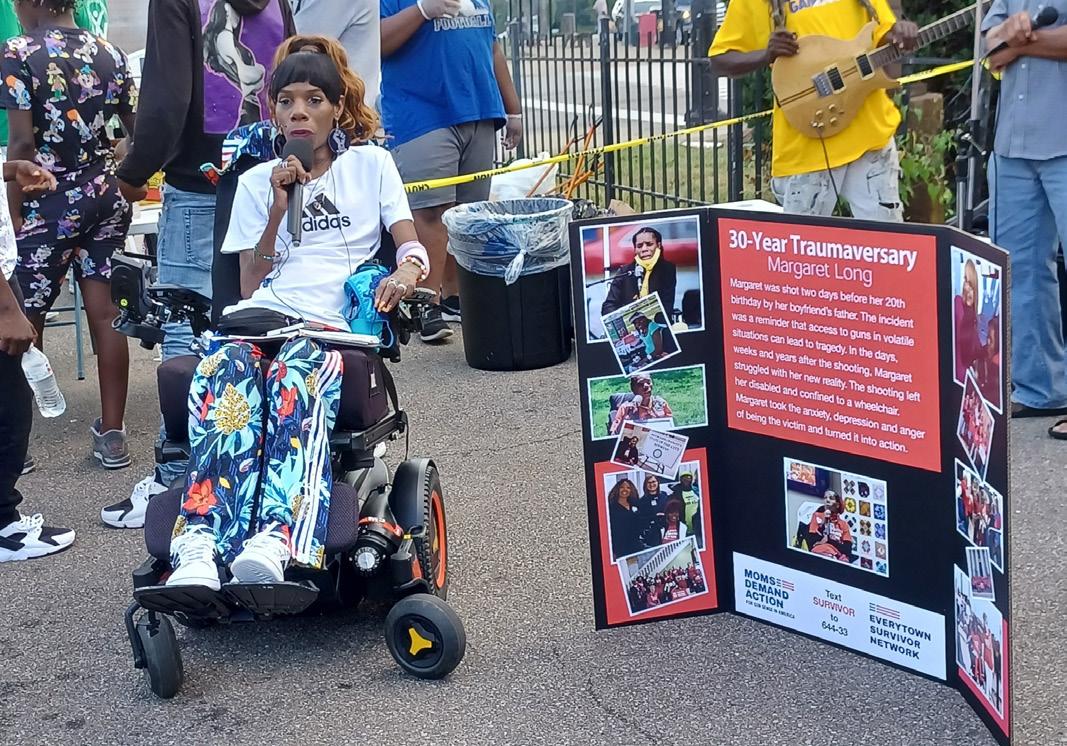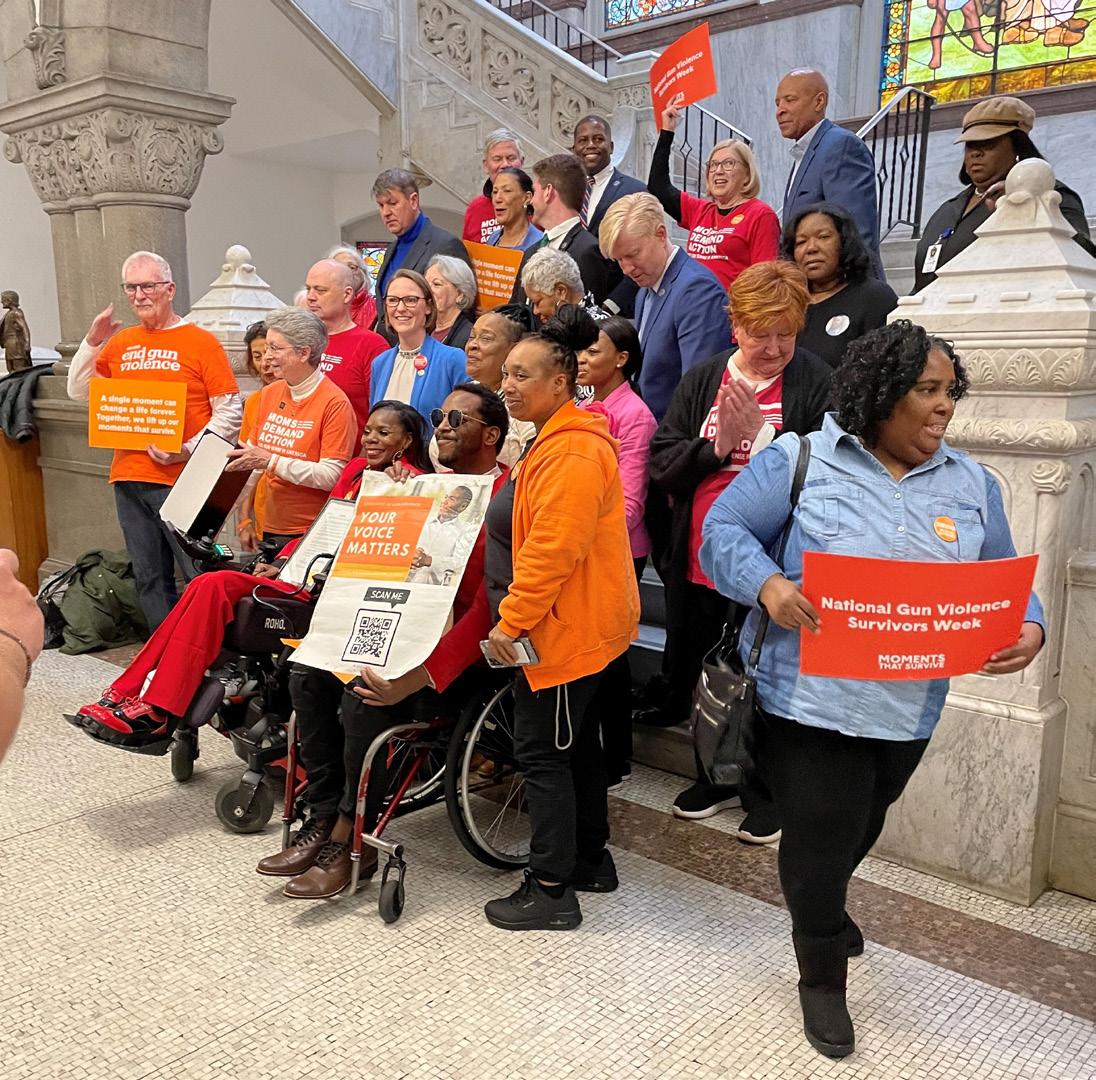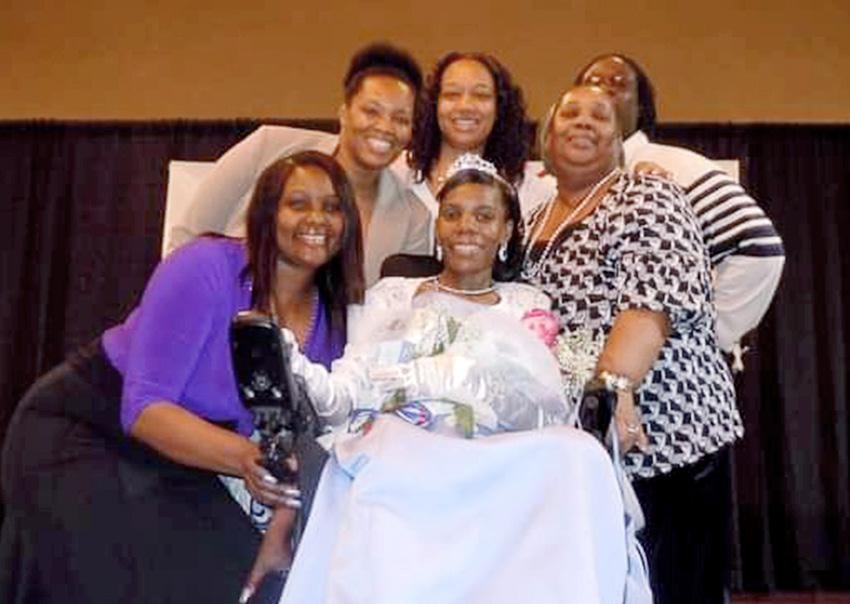
5 minute read
A Voice For Others
A Voice For Others
Margaret Long uses her story to fight for victims of gun violence and disability rights.
By Lisa Danford
“Sometimes, I have to use my hard voice,” Margaret Long says with a laugh. “If I feel like anything needs to be updated for accessibility, I’m going to tell someone.”
Long, 52, is a fierce disability rights advocate. She is deaf in her right ear and remembers being bullied in school for attending special education classes. But that wasn’t the experience that shaped her current advocacy.
A 50/50 chance
It was the summer of 1991. Long was about to turn 20 and spent the night out celebrating with friends. At the time, she didn’t live in a safe neighborhood and carried a knife to protect herself. On her way home, Long ran into her ex-boyfriend. They started arguing. He could tell she had been drinking, so he put his gun on the ground.
“I guess I had my knife on him and, whoever it was, picked up the gun on the ground and shot me,” she said. “The bullet hit me in the neck and came out my shoulder blade. It basically pierced my spine and paralyzed me on the spot.”
Long spent two weeks at UC Hospital, and doctors told her family there was a 50/50 chance she would survive. If she did, it was likely she wouldn’t be able to talk again. She spent another eight weeks receiving physical, occupational and speech therapy. “It was like being a newborn baby,” she said
about re-learning almost everything. It took time to process what happened. She cried a lot and was often in denial about her new reality. “At first, I was angry and bitter. But after a few months, I was adjusting and learning how to be in this new body and getting stronger,” she said.

Moving Forward
When she got out of the rehabilitation center, Long moved in with her sister and mom. After a couple of years, she felt confident enough to move out on her own. She got an apartment with a rollunder sink and other accessible features.
One afternoon in 2007, Long heard a familiar voice on the TV. It was Arthur Phelps—the man who shot her. “I was screaming at the top of my lungs. Then I laughed, and then I started crying again," she said. “I didn’t know what to do. It was a rollercoaster of emotions.”
Long met Phelps again at a community march in Avondale, 16 years after he shot her. “I wanted him to see what he did to me. On the inside, I was angry, but I had to show forgiveness,” Long said.
Local media extensively covered their reunion, and together, they shared their story at schools, detention centers, and other community events. It sparked Long’s activism, and she’s been speaking out on local, statewide and national stages ever since.

A Voice for Others
“Margaret is not afraid to tell you what’s on her mind, but I like that about her,” says Rayshawn Smith, founder of Unheard Voices Cincinnati. Smith, who is also a survivor of gun violence, works closely with Long on local initiatives.
“She keeps me on top of a lot. She’s a good person to work with and a good friend.”
Long is heavily involved with Moms Demand Action and other groups, sharing her story several times a month. In January, Cincinnati City Council recognized her as a National Gun Violence Survivors Week honoree.
“Gun violence often leads to disability— I’m going to fight for both,” she said.
Her advocacy also earned her the title of Ms. Wheelchair Ohio in 2011 with her platform—Endless Possibilities for People with Disabilities.
Closer to home, she pushed city and state officials to fix the sidewalks along Reading Road. It took countless phone calls, emails, and outreach to local media for the project to move forward. Now the area has curb cuts, a wider path for people who use wheelchairs, streetlights, and other features.
Her friend, Nakiea Spaulding, admires Long’s ability to always speak her mind and fight for what is right.
“She has a beautiful soul. Margaret is a go-getter and always has been,” Spaulding said. “I think that’s why we get along so well—we do not stop until we get what we want done.”
Even after nearly two decades of using her voice to create change, Long still continues to fight for better accessibility, transportation options, and other rights.
Even after nearly two decades of using her voice to create change, Long still continues to fight for better accessibility, transportation options, and other rights.
“People with disabilities often get left out. I’m not going to leave myself out, and I don’t want anybody else left out,” she said. “We’re trying to make the world more inclusive. Because without our voices, I don’t know who will fight for us.”










